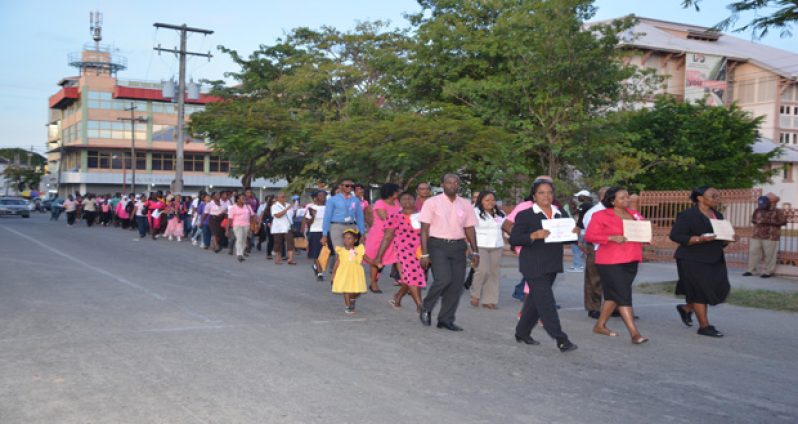“I WILL rise! For I have won the victory!” Strong words of affirmation coming from Minister of Social Protection Volda Lawrence last evening at a candlelight vigil to raise awareness on how to beat breast cancer and stay alive.

The event, held in the foreground of the Public Buildings, seat of administration of the Government of Guyana, was organised by the Ministry of Social Protection in conjunction with several Non-Governmental Organisations (NGOs), and saw close to 200 persons in attendance.
It began with a walk from the St. George’s Cathedral, just off Church and Carmichael Streets but closer to North Road in down-town Georgetown, and ended in the vigil at the Public Buildings, as part of a global drive to raise awareness about the complexities of breast cancer.
Observed every year in the month of October, the idea is to encourage early detection as one way of beating the disease.
As Minister Lawrence explained, the simple act of lighting a candle, a symbol of life, is a way of encouraging women to be strong and fight the good fight. And, noting that men are also afflicted by cancer, she said that they too need to be vigilant and empowered.
Speaking at the vigil also was cancer survivor and member of the Periwinkle Cancer Club, Bridgett Calendar, who explained that she has battled with cancer and won, and has remained cancer-free for over 10 years now.
Calendar further encouraged those diagnosed with cancer to “keep fighting and embrace it, for victory is sure.’’

Also, present was one Dr. Hart of the Ministry of Public Health, who identified chronic non-communicable diseases as a major health challenge, and that of the lot, cervical cancer has emerged as one of the areas in which the ministry can make a significant impact.
Early screening, she said, can help identify people who are at risk of developing cancer, so that with early intervention, they can either beat the disease entirely or prevent it from getting out of hand.
The evening was filled with a variety of musical renditions and testimonies from cancer survivors, and perhaps as a covenant among themselves, those at the vigil were encouraged to dunk their hands in a pink paint-like substance and leave their palm print on a white banner as a poignant reminder of the pledge they made.
By Clestine Juan



.jpg)










